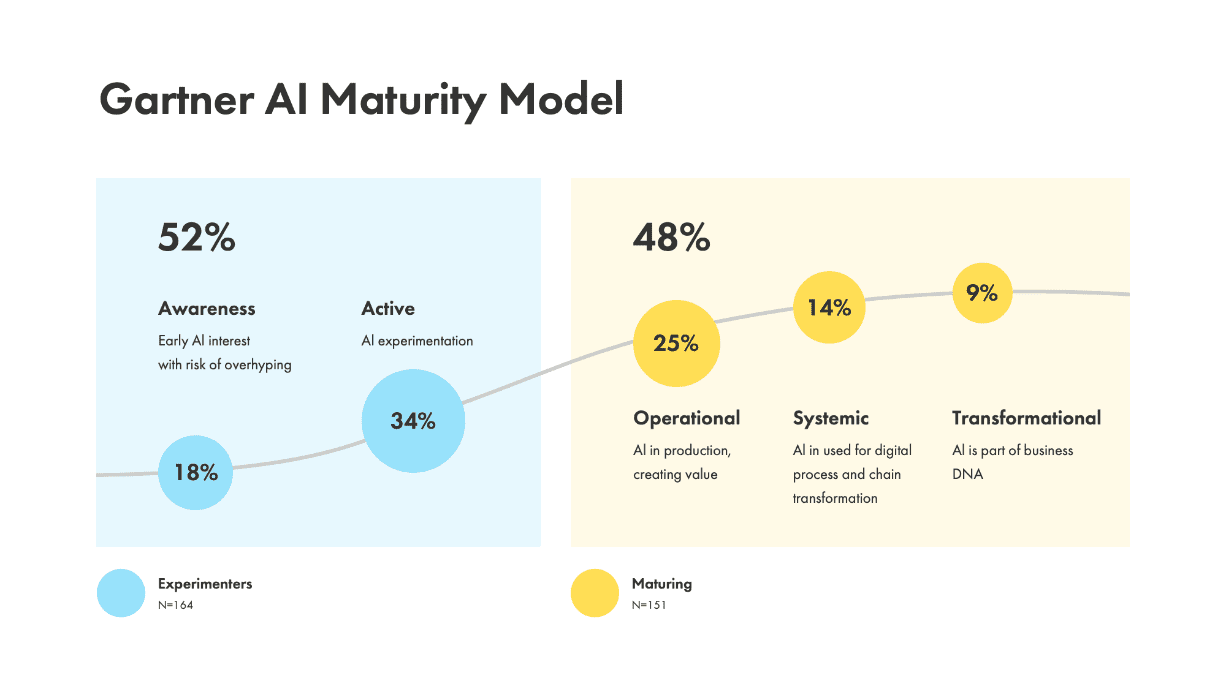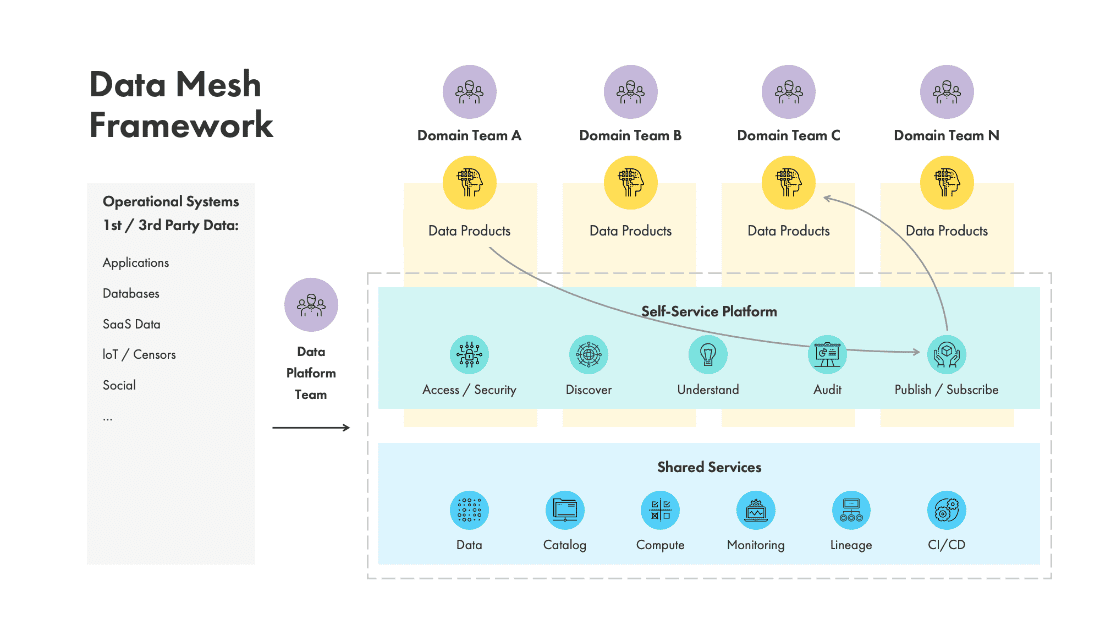[ad_1]

Picture by Google DeepMind
Within the relentless pursuit of innovation and securing a aggressive benefit, companies are progressively harnessing the facility of synthetic intelligence (AI) as a transformative device. The promise of AI to streamline operations, elevate decision-making processes, and unveil hid patterns inside knowledge has spurred its swift integration throughout industries, particularly in retail, manufacturing, and distribution.
Nevertheless, regardless of the compelling prospects, attaining the utmost advantages of AI hinges on a sturdy groundwork of information maturity. Sadly, quite a few enterprises encounter challenges in achieving this maturity because of varied elements. These challenges usually embody:
- Fragmented knowledge silos
- Poor knowledge high quality
- Restricted transparency about knowledge property and expertise
- Organizational inertia towards reestablishing a steadiness between expertise as an enabler vs. supplier of enterprise knowledge wants
On this article, I’ll spotlight prescriptive methods to beat these challenges towards establishing a sturdy knowledge basis for scaling differentiated AI capabilities.
Retail, manufacturing, and distribution leaders use AI’s energy to attain exceptional outcomes, from optimizing provide chains to predicting buyer conduct. Generative AI is gaining mainstream traction. A current Fortune/Deloitte CEO survey discovered widespread CEO curiosity within the potential of generative AI. In a current survey, 79% of chief executive officers expressed optimism in technology’s potential to enhance operational efficiency, with over half anticipating the emergence of latest avenues for development. A considerable portion revealed ongoing efforts in evaluating and experimenting with generative AI, underscoring a proactive method to harnessing cutting-edge developments within the enterprise panorama.
Business leaders with the very best ranges of AI maturity have demonstrated differentiated capabilities to drive gross sales and optimize operations. As an illustration, Amazon’s AI-powered advice engine, which suggests merchandise primarily based on a buyer’s previous purchases and shopping historical past, has been instrumental in driving gross sales. Equally, Walmart has efficiently used AI algorithms for stock administration and demand forecasting, which suggests the retail large is deploying AI to make sure that merchandise can be found when and the place its prospects want them.
But, in line with Gartner’s AI Maturity Mannequin, 52% of mid-to-large US organizations are still experimenting with AI.

Chief knowledge officers who play a necessary position in adopting AI and supporting digital transformation and are answerable for knowledge technique and governance inside organizations see knowledge high quality as one of many largest obstacles to totally leveraging AI capabilities, in line with a current AWS Survey of over 300 CDOs.
Let us take a look at the information maturity challenges that impression AI adoption and tips on how to overcome them.
Regardless of the plain potential of AI, many enterprises need assistance scaling AI-enabled use instances because of data-related hurdles. As organizations embark on bold AI initiatives, they usually encounter important roadblocks that hinder well timed implementation and widespread adoption. Organizations should prioritize knowledge maturity to navigate these challenges and totally understand the potential of AI.
Information maturity refers to a corporation’s capacity to successfully handle, govern, and make the most of its knowledge property. It encompasses knowledge high quality, governance, integration, and analytics capabilities. An absence of information maturity can result in a number of challenges that hinder AI adoption and scalability, corresponding to:
- Information Silos and Fragmentation: Information scattered throughout disparate methods and codecs creates knowledge silos, which might stop holistic utilization company-wide.
- Information High quality Points: Inaccurate, incomplete, or inconsistent knowledge can result in flawed AI fashions and unreliable insights.
- Information Governance Gaps: With out correct knowledge governance practices, companies can face points associated to knowledge safety, privateness, and compliance.
- Restricted Information Analytics Capabilities: The lack to extract significant insights from knowledge can hamper the event and utility of AI.
These challenges underscore the vital position of information maturity in enabling AI scalability. To beat these hurdles, enterprises should undertake a complete knowledge administration and governance method.
DataArt gives enterprises complete methods and options to reinforce knowledge maturity. We propel our companions towards a software program ecosystem the place knowledge is democratized, agile, and purpose-driven, surmounting obstacles hindering AI adoption. By fostering a tradition of information possession, empowerment, and innovation, enterprises are higher positioned to harness AI’s transformative potential and drive scalable, AI-enabled use instances, inserting themselves on the reducing fringe of a future outlined by data-driven excellence and sustained development.
The emergence of the Information Mesh and Information Product methods heralds a transformative paradigm shift within the international financial system. Information Mesh, a novel architectural method, advocates decentralizing knowledge possession and administration, fostering domain-driven knowledge structure throughout a single enterprise. This technique goals to alleviate the bottlenecks of centralized knowledge lakes or warehouses by distributing knowledge possession to domain-specific groups. Via this work of information distribution, Information Mesh empowers groups to curate, personal, and evolve their knowledge merchandise, selling agility and scalability whereas sustaining knowledge governance and high quality.

Determine 1: Information Mesh framework to allow quick worth realization by way of enterprise domain-driven knowledge merchandise.
Concurrently, the Information Product technique additional solidifies the muse for AI scalability. It champions the conceptualization, creation, and administration of information as merchandise that cater to particular person wants inside a corporation. Every knowledge product encapsulates useful insights, ready datasets, or analytical instruments tailor-made for consumption by numerous stakeholders. This method fosters a tradition of information possession and empowers groups to innovate, collaborate, and derive actionable insights from curated knowledge merchandise, accelerating AI adoption.
For instance, a buyer segmentation analytical knowledge product will be additional used to create churn knowledge merchandise, and each can be utilized for advertising functions to generate hyper-personalized content material for patrons. With out a knowledge product or knowledge product market, groups must spend time constructing these analytical capabilities from scratch. As a substitute, every new use case can reuse and repurpose current knowledge merchandise, decreasing improvement time and producing extra constant outputs.
As corporations throughout industries search simpler methods to handle their knowledge, a number of elements should be rigorously thought-about. Information democratization includes making knowledge accessible and comprehensible to stakeholders, like knowledge scientists, enterprise analysts, area consultants, administration, and executives. Moreover, corporations should guarantee their knowledge is available, legible but in addition safe, and compliant, with clear requirements and controls. Implementing the right safety and compliance measures will assist companies safeguard knowledge integrity, privateness, and regulatory adherence.
This evolution represents a sea change in how organizations harness knowledge. Traditionally, IT departments had been answerable for constructing their firm’s data-related modules, like warehouses and analytical knowledge merchandise. It could possibly develop into a expertise facilitator slightly than solely controlling knowledge entry and provisioning by implementing an AI-powered method to knowledge democratization. With a deployed AI-powered system, IT can focus its assets on empowering customers to independently navigate and derive insights from their firm’s knowledge. Enabling this transition requires a basic shift in IT’s position, shifting from gatekeepers to companions in fostering collaboration and innovation.
Information curation performs a pivotal position in making certain the standard, relevance, and value of information property inside a corporation. Nevertheless, sustaining it’s usually a problem because of the sheer quantity and number of knowledge sources, practical silos, and guide effort. This is likely one of the areas that may be improved with AI. AI-driven instruments and algorithms can automate knowledge processing duties, enabling sooner curation, knowledge cleansing, and normalization, decreasing guide efforts. AI algorithms can acknowledge patterns inside knowledge and contextualize info, facilitating extra correct curation and categorization.
By adopting and implementing these methods, enterprises can set up a powerful knowledge maturity basis, enabling them to harness AI’s energy successfully and scale AI-enabled use instances throughout their companies. As well as, DataArt may also help corporations set up or enhance core foundational capabilities that join expertise, folks, and processes, corresponding to:
- Breaking Down Information Silos: Integrating knowledge from disparate sources right into a centralized repository, making certain knowledge consistency and accessibility.
- Establishing Information Governance: Implementing a framework that defines knowledge possession, entry controls, knowledge high quality requirements, and knowledge utilization insurance policies.
- Enhancing Information High quality: Implementing knowledge high quality checks, cleaning processes, and enrichment methods to enhance knowledge accuracy and completeness.
- Fostering Information Literacy: Coaching staff on knowledge administration rules, knowledge evaluation methods, and data-driven decision-making to boost organizational knowledge utilization.
- Investing in Information Infrastructure: Upgrading knowledge infrastructure to deal with the rising quantity, velocity, and number of knowledge, making certain environment friendly knowledge storage, processing, and evaluation.
- Embracing DataOps: Implementing DataOps practices to automate knowledge administration processes, enabling speedy knowledge supply and steady enchancment.
- Leveraging Cloud-Primarily based Information Options: Using cloud-based knowledge platforms to realize scalability, flexibility, and cost-efficiency in knowledge administration.
- Steady Monitoring and Enchancment: Monitoring knowledge high quality, governance compliance, and utilization patterns to establish and deal with rising challenges.
Information maturity isn’t just a technical requirement; it’s a strategic crucial for enterprises in search of to unlock the transformative potential of AI. By addressing the vital challenges related to knowledge maturity, enterprises can pave the best way for a future formed by data-driven insights and AI-powered innovation.
Oleg Royz is a Vice President, Retail and Distribution at DataArt.
[ad_2]
Source link



